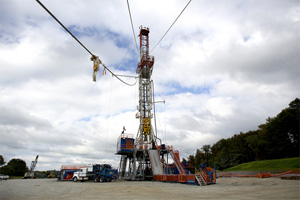Dutch Energy Council embraces unconventional gas
on
Dutch Energy Council embraces unconventional gas
The Dutch Energy Council, the highest advisory body of the Dutch government in energy affairs, has come out strongly in favour of the development of unconventional gas in the Netherlands. In an official advice to the government, the Council recommends a number of policies that should stimulate the exploitation of shale gas and coalbed methane in the Netherlands. Most importantly perhaps, the Council advises the government to ensure that landowners and tenants benefit financially from unconventional gas development on their land. This would enhance public support for the exploitation of unconventional gas, the Council says.
 |
| Shale gas drilling in the Marcellus shale deposit in the northeast of the US |
In addition, the Council emphasizes that in the transition to a low-carbon economy, gas-fired electricity generation is a better option than coal-fired power generation with carbon capture and storage (CCS). According to the Council, even gas-fired power stations without CCS produce less CO2 than coal-fired power stations that capture 80% of their CO2. Gas-fired power is also more flexible and can be “greened” through the use of biogas. For all these reasons, ‘gas deserves a more prominent place in the EU’s climate and energy policy’ than it has now, says the Council.
Chemicals
The Council sees considerable opportunities for the development of unconventional gas in Europe in general and the Netherlands in particular. However, it notes that there is a risk that the potential will not be fully used as a result of public resistance as well as environmental regulations, which are stricter in Europe than in the US. To overcome public resistance, the Council recommends that the government takes measures to let landowners and tenants profit from the production of unconventional gas on their land. Unlike in the US, land owners in Europe are usually not regarded as owners of the underground resources under their land. This means they experience nuisance from the activities on their land but no benefits.
The Council does not expect that companies in Europe will be exempted from environmental regulations, as has been the case in the US with the Energy Policy Act of 2005, which exempted shale gas developers in the US from the Safe Drinking Water Act. In the EU the so-called REACH legislation applies to the use of chemicals in the gas production process. But the Council says that current environmental legislation in the EU and in the Netherlands is fully adequate to ensure that unconventional gas production can be carried out without adverse effects on the environment. In fact, the Council advises the Dutch government ‘to make it clear (to the public) that current legislation is adequate’ in this regard. It even sees business opportunities for the Netherlands in tackling the environmental challenges associated with unconventional gas production, for instance in water management, in which the Netherlands has a lot of know-how.
Production cap
The Council warns that the expansion of unconventional gas should not lead to cancellation of new LNG processing capacity in the Netherlands. On the contrary, the government should try to stimulate the development of all forms of gas production and supply: gas from small and large conventional fields, biogas, green gas, LNG and gas from unconventional sources. Such a policy would enable the Netherlands to maintain its leading role as a producer and distributor of gas in the European market, the Council says.
The Netherlands is the only gas-exporting country in the EU, thanks to its huge Groningen field (“Slochteren”) in the north of the country. This field originally contained 2,800 billion m3 of gas, of which some 1,000 billion m3 is now left. (To give some idea of how much this is: annual consumption in a country like Germany is 78 billion m3, in the US it is 645 billion m3.) The Council even advises to ‘put a cap on the production from Groningen’, so that this field can be kept in production as long as possible and provide flexibility to the Dutch gas system.
The Council notes that several foreign producers and investors have become active in recent times in the exploration of unconventional gas resources in the Netherlands, including the Australian Queensland Gas Company, Cuadrilla Resources from Canada and Quantum Energy Partners from the US.
The Dutch government supports the Council's recommendations on the development of shale gas, a spokesman of the Ministry of Economic Affairs tells EER.
|
Energy Council The Dutch Energy Council (Algemene Energieraad), established in 1976, is an official advisory body to the Dutch government. The members of the Energy Council are appointed by the Crown and do not represent political movements. They are appointed in their private capacity because of their expertise, social knowledge and experience. The Council's advice on unconventional gas is not (yet) available in English. |
|
Shale gas in UK and Germany The British Geological Survey has an interesting section on unconventional gas. |


Discussion (0 comments)